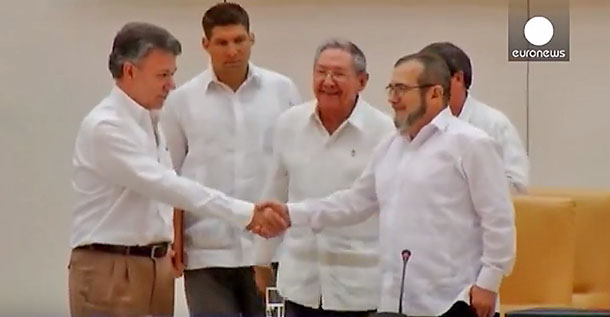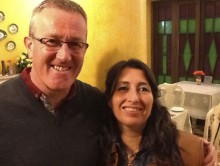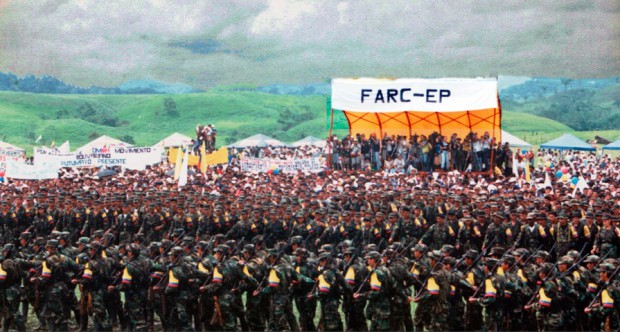29 August 2016
Ceasefire in Colombia comes into effect – ending 52-year-long war

Colombian President Juan Manuel Santos (left) shakes hands with FARC-EP rebel leader Rodrigo Londono alongside Cuban President Raúl Castro (centre)
A CEASEFIRE between the Colombian Government and the Revolutionary Armed Forces of Colombia – People's Army (FARC–EP) came into effect at midnight bringing, what many hope is, a permanent end to one of the world's longest-running armed conflicts.
The ceasefire came after the Colombian Government and FARC reached a major peace agreement after almost four years of negotiations facilitated by the Cuban Government in Havana.
More than 220,000 people have been killed and millions displaced in the civil war between the Colombian Government aided by their paramilitary death squads, and the leftist guerrillas of the FARC-EP and also the smaller National Liberation Army (ELN).
The conflict began when Colombian military units attacked isolated rural communities where peasants were demanding agrarian and land reform. In response the FARC emerged to resist such attacks and later went on the offensive against the Colombian Government.
Iván Márquez, who headed FARC's peace delegation, said of the Agreement:
“We have the conviction that we have accurately interpreted the feeling of our comrades-in-arms and ideas, who always fought in the belief of a political solution to the conflict and the construction of a just country.”
The agreement addresses key issues including a comprehensive rural reform package which aims to tackle poverty and focus on increased social development in the areas of health, agriculture, education and housing.
Opposition political groups will be permitted to operate in security with access to media while FARC fighters are to be provided supports to allow them reintegrate into civilian life.
The long-running conflict also allowed an illicit drug trade based around the production of cocaine to take hold in some areas of the country. Part of the peace deal will see a the Government and FARC “build a joint and comprehensive solution to the problem of illicit drugs”.
The Agreement also includes “Comprehensive System of Truth, Justice, Reparation and Non-repetition” tasked with addressing the rights of victims.
The FARC and Government have pledged to work together on identifying and removing unexploded mines and other explosives across the country.
Sinn Féin leader Gerry Adams TD has commended FARC and the Colombian government for this historic agreement – as well as the Cuban and Norwegian governments for making such negotiations possible.
A number of Sinn Féin politicians have been involved in the Colombian Peace Process discussions in Havana and Colombia, including Martin McGuinness MLA, Conor Murphy MLA (pictured), Alex Maskey MLA and Jennifer McCann MLA.

“Agreements are only part of any resolution of conflict,” said Gerry Adams. “As we know from the Irish Peace Process, the implementation and honouring of agreements is crucial to their success. There is an onus on all of the participants to the Colombian peace process, but especially the Government, to ensure that the agreement reached is implemented in full.”
Ordering all FARC units to stand down and dump weapons, the group's most senior military leader, Rodrigo Londono, said:
“May the rebellion never be necessary again! Long live social justice, Colombia and peace!”
Welcoming the agreement, United Nations Secretary-General Ban Ki-Moon said:
“After so many years of conflict, it may be difficult for many Colombians to imagine a future in peace. Yet the opportunity is at hand today and I hope they will be able to seize it.”
The people of Colombia are expected to ratify the agreement via popular referendum in the coming months.

Follow us on Facebook
An Phoblacht on Twitter
Uncomfortable Conversations

An initiative for dialogue
for reconciliation
— — — — — — —
Contributions from key figures in the churches, academia and wider civic society as well as senior republican figures





